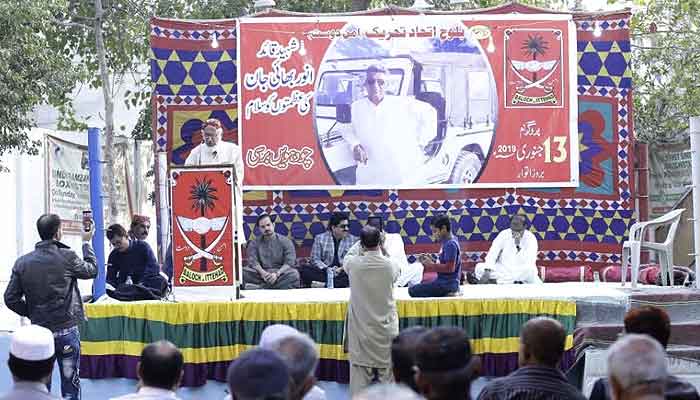Remembering Anwar Bhaijan — a powerful voice against Lyari gangsters, drug dens
A large number of Lyari’s residents, political leaders and activists on Sunday evening gathered in Chakiwara to pay tributes to Anwar Bhaijan, a known activist and founder of the Baloch Ittehad Tehreek (BIT), who was killed by gangsters 14 years ago for leading a campaign against criminal gangs and drug sellers in the area.
The condolence gathering was held at the organisaton’s office to mark the death anniversary of Bhaijan, who was shot dead in January 2005 near Gharib Shah Mazar in Kalakot.
Speakers lauded his services for Lyari and pledged to work for peace and harmony, for which the BIT founder had laid down his life.
Shakoor Shah, the Pakistan Tehreek-e-Insaf’s MNA from Lyari, Javed Nagori, the Pakistan Peoples Party’s former provincial minister, Nadir Shah Adil, veteran journalist, Ramazan Baloch, author and researcher, Waja Sadiq Baloch, a social activist, and Umair Razzaq, a youth activist, were prominent among the speakers.
Bhaijan emerged on the political landscape of Lyari in the late 1980s as an influential Baloch leader, when he formed the BIT in Karachi, which was then in the grip of gang violence and ethnic strife.
Ramazan Baloch, author of books on Lyari, said Bhaijan and his organisation were very popular in the 1980s and 1990s not only in Karachi’s Baloch neighborhoods but also in Balochistan and rural Sindh because of his social services.
“There were some instances of police brutalities and killings of community people that forced Baloch activists of various areas to form a separate Baloch social-cum political group to protect their rights,” he told The News on Sunday.
He said Ghulam Rasool Magsi, Imam Bakhskh Sajidi were also key leaders who helped Bhaijan to form the BIT. “Local residents used to visit Bhaijan to resolve their local disputes,” he said.
The BIT made headlines when it launched effective protests against drug peddlers, gang members and a rise in unemployment among Lyari youths. Bhaijan was also put behind bars for sometime during the 1980s.
The BIT did not take part in the elections directly, but in 2002 it fielded two candidates -- noted educationist Prof Ali Muhammad Shaheen from Lyari’s National Assembly constituency and its leader Abid Hussain Brohi for a provincial assembly seat -- on the tickets of the Sindh Democratic Alliance (SDA). Both lost.
Brohi, who is now the BIT’s head, said that with peace limping back to Lyari after the weakening of criminal gangs, thanks to the ongoing crackdown, the BIT leaders were making a strategy to resume the organisation’s activities for the development of the area.
“The participation of Lyari’s serious activists in Sunday’s condolence gathering shows that the area needs the BIT’s revival and bringing Bhaijan’s cause forward,” Brohi told The News.
He said that after the death of Bhaijan, the BIT had organised several programs but did not show its street power. “Criminal gangs are gone, but the city’s oldest settlement is still deprived of basic facilities. It is the reason to resume the BIT,” he said. Gangsters associated with Rehman Dakait killed Bhaijan on January 9, 2005, because he led the campaign against the gang violence and drug selling.
-
 Man Convicted After DNA Links Him To 20-year-old Rape Case
Man Convicted After DNA Links Him To 20-year-old Rape Case -
 Royal Expert Shares Update In Kate Middleton's Relationship With Princess Eugenie, Beatrice
Royal Expert Shares Update In Kate Middleton's Relationship With Princess Eugenie, Beatrice -
 Andrew Mountbatten-Windsor’s Leaves King Charles With No Choice: ‘Its’ Not Business As Usual’
Andrew Mountbatten-Windsor’s Leaves King Charles With No Choice: ‘Its’ Not Business As Usual’ -
 Dua Lipa Wishes Her 'always And Forever' Callum Turner Happy Birthday
Dua Lipa Wishes Her 'always And Forever' Callum Turner Happy Birthday -
 Police Dressed As Money Heist, Captain America Raid Mobile Theft At Carnival
Police Dressed As Money Heist, Captain America Raid Mobile Theft At Carnival -
 Winter Olympics 2026: Top Contenders Poised To Win Gold In Women’s Figure Skating
Winter Olympics 2026: Top Contenders Poised To Win Gold In Women’s Figure Skating -
 Inside The Moment King Charles Put Prince William In His Place For Speaking Against Andrew
Inside The Moment King Charles Put Prince William In His Place For Speaking Against Andrew -
 Will AI Take Your Job After Graduation? Here’s What Research Really Says
Will AI Take Your Job After Graduation? Here’s What Research Really Says -
 California Cop Accused Of Using Bogus 911 Calls To Reach Ex-partner
California Cop Accused Of Using Bogus 911 Calls To Reach Ex-partner -
 AI Film School Trains Hollywood's Next Generation Of Filmmakers
AI Film School Trains Hollywood's Next Generation Of Filmmakers -
 Royal Expert Claims Meghan Markle Is 'running Out Of Friends'
Royal Expert Claims Meghan Markle Is 'running Out Of Friends' -
 Bruno Mars' Valentine's Day Surprise Labelled 'classy Promo Move'
Bruno Mars' Valentine's Day Surprise Labelled 'classy Promo Move' -
 Ed Sheeran Shares His Trick Of Turning Bad Memories Into Happy Ones
Ed Sheeran Shares His Trick Of Turning Bad Memories Into Happy Ones -
 Teyana Taylor Reflects On Her Friendship With Julia Roberts
Teyana Taylor Reflects On Her Friendship With Julia Roberts -
 Bright Green Comet C/2024 E1 Nears Closest Approach Before Leaving Solar System
Bright Green Comet C/2024 E1 Nears Closest Approach Before Leaving Solar System -
 Meghan Markle Warns Prince Harry As Royal Family Lands In 'biggest Crises' Since Death Of Princess Diana
Meghan Markle Warns Prince Harry As Royal Family Lands In 'biggest Crises' Since Death Of Princess Diana




